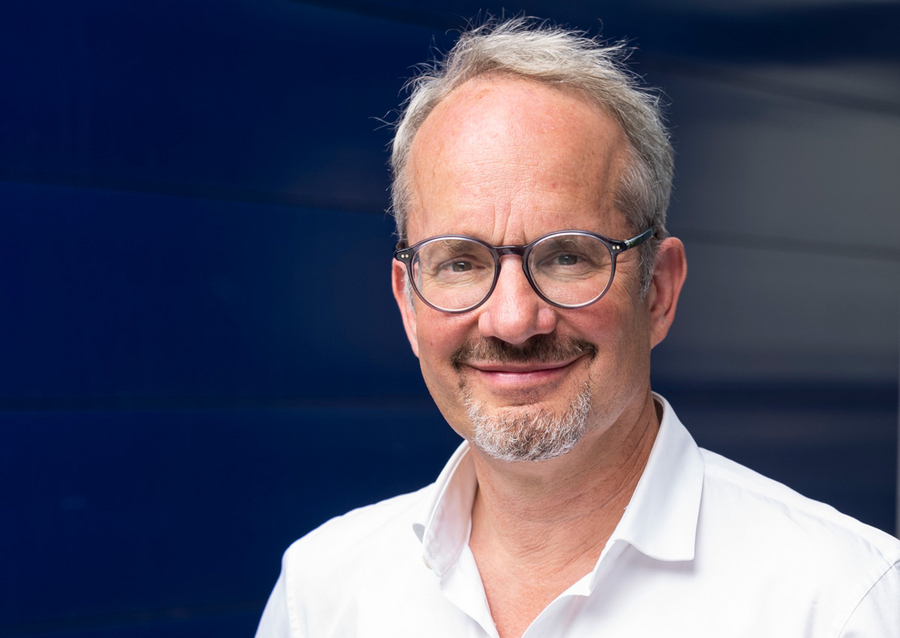
© Sven Döring
The Human Frontier Science Program (HFSP) has announced that the 2021 HFSP Nakasone Award will be awarded to Anthony Hyman of the Max Planck Institute of Molecular Cell Biology and Genetics, Dresden (Germany) and Clifford Brangwynne of Princeton University and the Howard Hughes Medical Institute (USA) for their discovery of a new state of biological matter, phase-separated macromolecule condensates, that play an important role in cell organisation, gene regulation, signalling and pathology.
The HFSP Nakasone Award was established to honour scientists who have made key breakthroughs in fields at the forefront of the life sciences. It recognizes the vision of Japan’s former Prime Minister Nakasone in the creation of the international science funding organisation.
In their 2009 publication, Cliff Brangwynne and Anthony Hyman reported that P-granules, which specify the germ line in C. elegans development, are phase-separated droplets consisting of specific proteins and RNAs that assemble into a liquid condensate in order to concentrate on one side of the egg cell. This finding confirmed membrane-free compartmentalization of cell organelles and was completely unexpected. They recognized the importance of their discovery as revealing a new form of biological matter and correctly predicted that phase separated liquid macromolecule condensates would be widespread in biology, with multiple roles in normal biology and pathogenic processes. Brangwynne and Hyman went on to discover that nucleoli, the ribosome factories in the nucleus, are also phase separated liquid condensates – the second example after P-granules.
“The stunning discoveries of Anthony Hyman and Cliff Brangwynne are a textbook example of how biology is shaped by biophysical processes,” said Warwick P. Anderson, HFSPO Secretary-General. “Research by the HFSP Nakasone Award winners demonstrates the benefits resulting from basic research at the frontiers of the life sciences.”
Phase separation biology is now the fastest growing and most exciting area in all cell biology, with hundreds of laboratories working on the problem. A set of landmark papers in 2019 demonstrated a central role of phase separation of transcription factors in regulation of gene expression in human cells. Condensates are a frontier area in cell biology research worldwide, with hundreds of papers coming out in high impact journals across all areas of biology. Condensates play central roles in gene regulation, photosynthesis and the barrier function of human skin and many other aspects of biology.
The drug discovery industry has been quick to recognize the potential of phase separation biology, and several biotech companies have been founded in this area. Multiple companies have started to explore drugging condensates to treat human disease, with the hope of ‘drugging the undruggable’. Early progress suggests it will be possible to both up- and down-regulate the function of proteins that are not conventionally druggable, such as transcription factors, viral matrix proteins and RNA binding proteins, by modulating their dynamics in condensates.
Anthony Hyman received his PhD from the Laboratory of Molecular Biology, MRC in Cambridge, UK in 1987. From 1988-1992, he was a postdoctoral fellow at the University of California, San Francisco. In 1993, he became a Group Leader at the European Molecular Biology Laboratory in Heidelberg, before he moved to Dresden in 1999 as one of the founding directors of the Max Planck Institute of Molecular Cell Biology and Genetics (MPI-CBG). He was elected as a Fellow of the Royal Society in 2007 and awarded the Gottfried Wilhelm Leibniz Prize in 2011. Most recently, in 2017, he received the Schleiden Medal from the German National Academy of Sciences Leopoldina and in 2020 he was elected as an international member of the National Academy of Sciences.
Cliff Brangwynne received a PhD in Applied Physics from Harvard University in 2007. He was a postdoctoral researcher at the Max Planck Institute of Molecular Cell Biology and Genetics and the Max Planck Institute for the Physics of Complex Systems from 2007 to 2010, prior to joining the faculty of Princeton University in 2011, where he is currently a Professor in the Department of Chemical and Biological Engineering, and an Investigator at the Howard Hughes Medical Institute. He is the recipient of numerous awards including a Searle Scholar, NSF CAREER Award, NIH New Innovator Award, ASCB Emerging Leader, Sloan Fellow, Blavatnik Award and in 2018 he was awarded the prestigious MacArthur Fellowship.
In February 2020, Anthony Hyman and Cliff Brangwynne were co-recipients of the Wiley Prize in Biomedical Sciences for their pioneering studies in cell biology.
Press release of the HFSP
The HFSP Nakasone Award was established in 2010. Previous recipients are Karl Deisseroth (2010), Michael Elowitz (2011), Gina Turrigiano (2012), Stephen Quake (2013), Uri Alon (2014), James Collins (2015), Jennifer Doudna and Emmanuelle Charpentier (2016), David Julius (2017), Svante Pääbo (2018), Michael Hall (2019), and Angelika Amon (2020).
The Human Frontier Science Program was founded in 1989 to advance international research and training at the frontier of the life sciences. It is supported in 2020 by contributions from the G7 nations, together with Switzerland, Australia, India, Israel, New Zealand, Singapore, Republic of Korea and the European Union. With its collaborative research grants and postdoctoral fellowships, the Program has issued over 4500 awards involving more than 7500 scientists from all over the world.